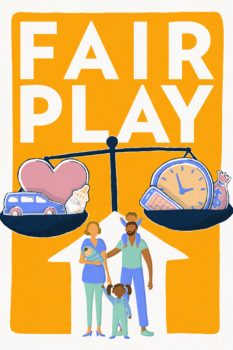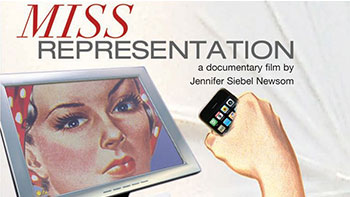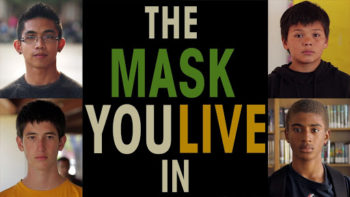For nearly twenty years, CBS’s reality TV series Survivor has entertained viewers with strategy, “social game,” blindsides, and immunity idols as contestants try to outwit, outlast, and outplay one another in the quest for the million-dollar prize. In its current season, the show found itself broadcasting the realities of the #MeToo movement into living rooms nationwide. But the past two episodes have provided a front-row seat into how these issues play out in workplace and community settings. The events and ensuing conversations about sexual harassment have provided riveting television and plenty of Twitter fodder. And the incident at the center of the controversy provided an opportunity for families, who comprise a large audience for the PG13 show, to have a conversation about the nuances and implications of bad behavior.
Survivor is no stranger to controversy. Casting people from all backgrounds and walks of life, the contestants are forced to live together on an island with little to no provisions while competing against one another for the title of sole survivor. In a 2017 episode of the show, one contestant outed another contestant as transgender—against his will. GLAAD called the incident gut-wrenching, saying: “Not only is [outing] an invasion, it can have negative consequences in a world that is very intolerant of gender diversity. Transgender people can lose jobs, housing, friends, or even their lives when other people find out about their gender history.”
In this drama-filled current season, viewers have already watched as two contestants dealt with the ramifications of a culture clash where one white male contestant called a black male contestant’s buff (the iconic headband that identifies each contestant’s team) a du-rag. The incident became a teaching moment where fans witnessed a deeper conversation emerge about cultural differences, unconscious bias, and the power of words. In this situation, there was a lot of healing, understanding, and empathy modeled for viewers.
But in recent weeks, a storyline has emerged about a male contestant, Dan Spilo, whose overly touchy contact with his female tribemates became a cause for concern and a matter of safety. Survivor showed night-vision footage of Dan spooning another young woman, Missy Byrd, as the two slept in the outdoor bungalow contestants build on the island. In the morning, Missy shared her discomfort with the situation but did not confront Dan. She did, however, confide in fellow tribemate Kellee Kim, about how she felt. Kim, in turn, shared her own experiences with unwanted touching by Dan. Kellee had confronted Dan about his touching early in the show, but the pattern continued. As concerns mounted among the women on the show, Survivor producers took the unprecedented step of intervening on the women’s behalf. While not aired, the show told viewers that producers held an individual meeting with Dan and a group meeting with the entire cast to address the events, which many of the women considered sexual harassment.
The show continued, with producers claiming that all parties had reached a detente. But it didn’t take long before things heated up again. In one completely shocking scene, Missy and fellow contestant Elizabeth Beisel, a former Olympic swimmer, concocted a scheme to convince Kellee that Elizabeth was also sexually harassed by Dan. Elizabeth falsely accused Dan, who most certainly was guilty of harassing others, of also harassing her. Her reasoning was cited as a strategy to further herself in the game show.
Fast forward a bit, and Kellee was voted off the show—much to the surprise of Janet Carbin, the mom-figure on the show, who thought that the consensus among the women was to vote Dan off as a way to protect the women. Kellee’s outspokenness about how Dan had made her feel was mentioned as one of the reasons why she was voted off. When Janet confronted the women about why they didn’t get rid of Dan, they confessed that they had exaggerated their claims against Dan, stating that they were themselves fine with their interactions with Dan or worse, never had them in the first place.
There are so many problems with what occurred in these two episodes. The show dealt with Kellee’s genuine and very real feelings of discomfort with Dan’s physical behavior toward her and other women on the show. Kellee expressed why she had such a hard time speaking up about what was happening. “It’s super upsetting because it’s like you can’t do anything about it. There are always consequences for standing up. This happens in real life, in work settings, in school. You can’t say anything because it’s going to affect your upward trajectory. It’s going to affect how people look at you.” It seemed that Kellee was correct, however, that should not be a reason not to speak up!
Even after the show’s producers spoke to Dan, he continued to cross physical boundaries with women—completely unaware of how he was making some of them feel. What’s worse is that Dan is a Hollywood talent agent. Dan (and all men) should absolutely know better!
The episodes also dealt with women making false accusations in the midst of legitimate claims. This is highly problematic in an era where men are increasingly expressing fear about traveling with and meeting along with women co-workers, something which will undoubtedly affect their chances for promotions and raises in the future. Elizabeth, the woman at the center of the false claim, was scorned on social media. And in response, she issued the following statement:

While the show somehow managed to get it right when showing how the two contestants worked out their differences about the racially charged comment earlier in the season, the show’s handling of this sensitive topic was an utter disaster for Survivor. Media outlets from The Washington Post to NBC News, the focus of its own #MeToo controversy, weighed in and slammed the show for its mishandling of the subject. Maybe we shouldn’t be too surprised, given that this is a Mark Burnett show, and it airs on CBS, the network formerly headed by Les Moonves, himself alleged of having committed sexual harassment and intimidation at the network he headed for fifteen years.
But one can only hope that the most recent episode, in particular, sparked important conversations among home viewers about the important subjects of boundaries, inappropriate touching, sexual harassment, and false accusations in interpersonal situations. Survivor showed us all how these matters affect everyone involved, especially when they are handled so poorly.
Take Action! When reality television shows get is dramatically wrong, as Survivor did in their handling of this incident, use our hashtag #NotBuyingIt when you post on social media about the show.



